Feed Store Where to Buy Live Chicken
It's a heartbreaking moment…
When you first realize your homegrown eggs are costing you more than what you'd pay for eggs at the store…
The current state of mass food production has duped us into believing things like milk, eggs, and grains cost much less than they actually do or should.
For example: Even though we have our own milk cow, our milk technically costs me MORE than it would to simply buy a gallon at the grocery store.
The good news? Saving money isn't the primary reason we've chosen to own a cow. For us, it's really about the quality of the product; our milk is fresh, beyond organic, and wonderfully raw. Not to mention owning a cow just plain makes me happy, so it's a quality of life thing for us as well.
Chickens and eggs fall into the same category. While it depends on feed prices in your area, I'm still going to venture to say if you are looking for "frugal" eggs, you'll probably be better off buying eggs from the store. But, that's not the reason most of us keep chickens, right? We love the bright yellow yolks, the satisfaction of watching the hens peck around the yard, and all that comes with chicken-ownership.
However, if you experienced sticker-shock the last time you walked into the feed store, take heart! There are plenty of ways to save money on chicken feed AND boost your flock's nutrition in the process. This list will help you get started—>
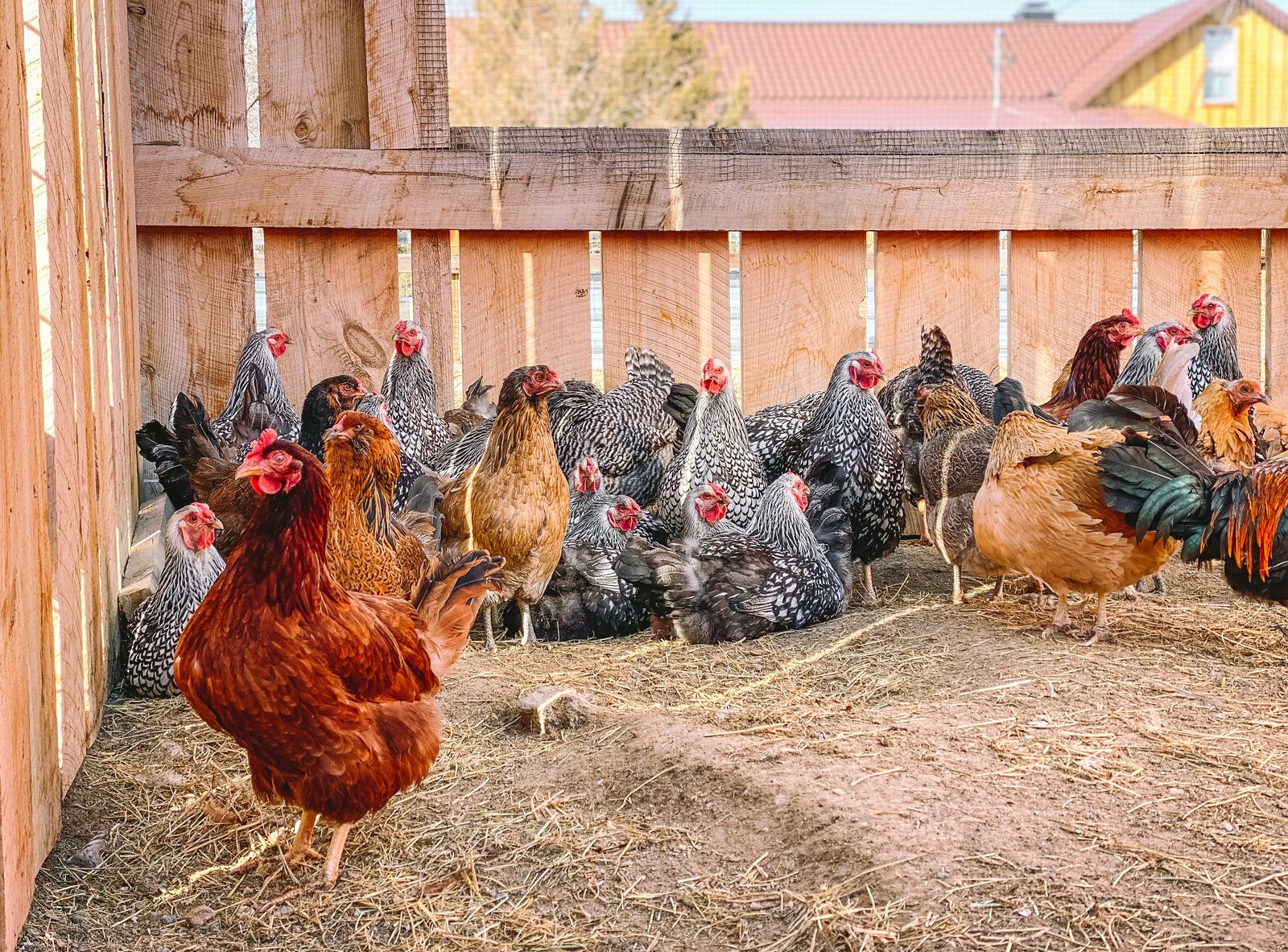
20 Ways to Save Money on Chicken Feed
1. Shop Around for the Best Priced Quality Chicken Feed
When I started calling different feed mills, I was surprised at the huge difference in prices. Just remember– cheaper isn't always better, and if you are feeding an ultra low-quality feed, it can be very hard on your birds. Never sacrifice your chickens' health just to save a buck.
Note: If egg production is your main goal, low-quality feed will greatly reduce the quantity and quality of the eggs your hens produce.
2. Choose the Right Chicken Feeder
Chickens are notorious for playing with their food and causing a lot of waste. The right feeder can help prevent waste and save you money in the long run. It can be tempting to just grab the nearest dish or container to simply feed your chickens, but a spillproof feeder with a top on it
3. Mix Your Own Feed to Save Money on Chicken Feed
I say this with a wee bit of hesitation, since depending on your situation, it may actually be MORE expensive to mix your own feed… However, I do suggest finding a recipe you like (all my homemade chicken feed recipes are in my Natural Homestead book), and then shopping around with local feed stores to see how much it would cost for them to mix it for you. Also, don't forget to check with the local farmers in your area. Sometimes they'll have older grains sitting around that aren't fit for human use but would be fabulous for your flock.
4. Buy in Bulk to Save on Chicken Feed
I buy everything in bulk, including my chicken feed. Often feed stores will give you a cut if you purchase a pallet of feed, rather than just a bag or two. Another trick is to split a large order with a friend. My one caveat is this: chicken feed which has been ground/processed/cracked, rapidly loses nutrition as it sits. It's probably not a good idea to purchase a year's supply at a time unless you are using a recipe that calls for whole grains–they are much more shelf-stable.
5. Ferment Grains to Save Money on Chicken Feed
Fermented chicken feed is basically grains that have sat in water for a period of time. These grains have been what is known as lacto -fermented; this is the same process that is used to ferment sauerkraut. The process of fermenting creates good bacteria also known as probiotics which greatly increases nutrient intake and decreases the amount they eat.
Note: The probiotics increase nutrients so that your hens will lay better quality eggs as well.
6. Stop Feeding Free-Choice Chicken Feed
This is actually a topic with a bit of debate surrounding it… (Have you noticed everything causes a debate these days?) While I like the thought of allowing my flock to self-regulate, it can be a problem if you have lots of rodents. Rats and mice think free-choice chicken feeding is the best thing ever, and if you struggle with rodent problems in your coop, it's likely your all-you-can-eat grain buffet is to blame. This problem can be avoided by only feeding as much as your chickens can eat in one day.
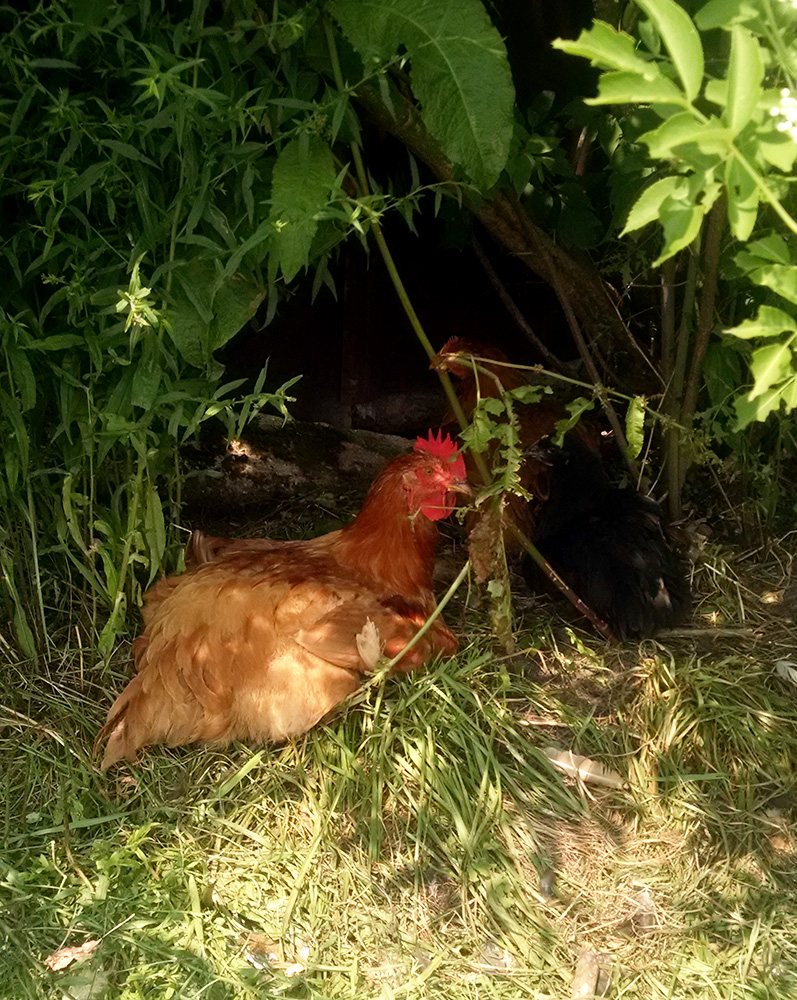
7. Free Range Your Chickens as Much as Possible
I realize this isn't possible for everyone, but if you can, allow your chickens to roam around your yard. Not only will this greatly supplement their diet, but it can also help to control bug populations, and keeps them from becoming bored. Plus, there is something so soothing about watching chickens scratch around your front porch.
8. Bring the Yard to the Flock, if the Flock Can't Roam the Yard
When my hens must stay confined to their pen in the summer months (usually because they are destroying my almost-ripe tomatoes), I like to pick large handfuls of weeds or grass and toss them over the chicken-run fence. The girls definitely enjoy rummaging around in the green matter. I also like to take a bucket to the garden with me when I weed, and I collect all the weeds in the bucket and transport them to the flock as well. (Although I don't have near as many weeds as I used to, thanks to my deep-mulching adventures!)
9. Use Chicken Tractors When You Can't Free Range
If you can't allow your chickens to free-range an alternative that saves on feed costs is a chicken tractor. Chicken tractors are mobile coops that have wheels or are light enough to move around the yard. This allows your chickens to free-range in a confined setting.
Chicken tractors have been a great tool on the homestead, especially for free-ranging our meat chickens. It not only cuts down on the feed costs but allows them to get in exercise as well!
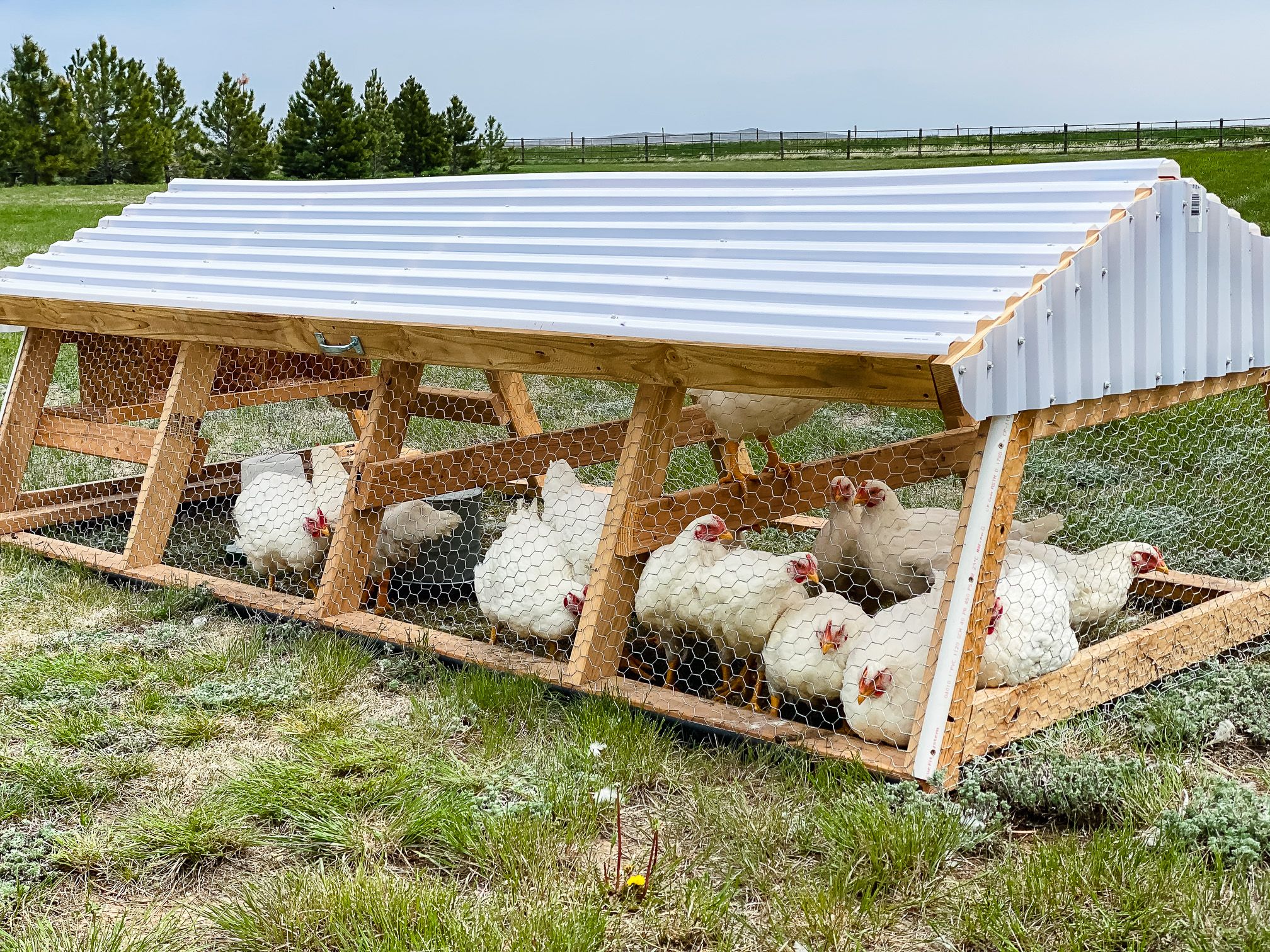
10. Ask for Leftover Vegetable and Fruit Scraps at the Grocery Store.
Not all stores will allow this, but ask if you can have the wilted lettuce, squishy tomatoes, and bruised apples. Some folks also collect stale bread items from bakeries, but I personally avoid this. Many of the bread items sold in stores like donuts, breads, rolls, or muffins are made with heavily processed ingredients and additives. They might be okay for the occasional treat, but they aren't something I'd recommend feeding on a regular basis– just as humans shouldn't eat them as the bulk of their diet.
11. Grow Your Own Food Sources to Save Money
Chickens eat all kinds of different things that naturally grow, if you are already growing a garden or have extra space then what better way to save on chicken than growing your own food sources. Growing food sources doesn't mean that you need to provide your flock's entire source of food (if you can that is great), it just means supplementing with things that you can grow on the side. Two ways you can do this is by growing a chicken garden or actually growing feed grain and seeds for your chickens.
- Grow a Chicken Garden
Chicken gardens are a great way to save on feed for both free-range and cooped chickens. For chickens that are free-ranging, you can set aside an area to plant extra vegetables, fruits, herbs, and various cover crops for them to snack on while out and about. If your chickens aren't able to free-range you can plant your extra produce, and herbs along the chicken run within reach. - Grow Actual Feed Grains and Seeds
This is another one of those things that could be less cost-effective if you are trying to grow a commercial-sized feed operation. However growing extra feed grains, oats, barley, or even sunflowers to supplement the amount of store-bought feed you purchase can help with the bill.

12. Grow Duckweed to Save Money on Chicken Feed
I haven't tried growing my own duckweed yet, but I'm totally intrigued! Duckweed is a high-protein plant that can be fed to a variety of animals, including chickens. If you're a duckweed grower, please leave a comment and share your wisdom!
13. Raise Soldier Grubs to Feed Your Chickens
As tough as I like to think I am, I must confess I'm still not quite ready to tackle the whole concept of raising grubs/larvae for my birds. Do I think it's incredibly smart? YES. Do I think it's a fabulous way to create low-cost, high-protein feed? YES. Do I want to get up-close and personal with maggots? Eh, not quite yet. If you're braver than me, my chicken-keeping idol, Harvey Ussery, has a chapter in his book(affiliate link) devoted entirely to cultivating soldier grubs.
14. Offer Leftover Milk and Whey
If you own dairy goats, cows, or sheep, you are familiar with the feeling of drowning in milk. When you're floating in milk and have made all the homemade yogurt and mozzarella cheese you can handle, consider sharing your excess with your chickens. Leftover milk and whey are full of protein and most flocks will enjoy the treat. For an extra boost of probiotic nutrition, clabber your raw milk by allowing it to sit out at room temperature for several days until it begins to thicken. (Don't attempt this with pasteurized milk– you will not have the same results.)
15. Save Kitchen Scraps for Your Flock.
I keep a small bucket on my kitchen counter at all times and continually toss in bits of leftover bread, celery ends, carrot peelings, watermelon rinds, and more. It's a feeding frenzy when I show up at the coop. My chickens have even been known to chase me down in the yard when they see me carrying any sort of white bucket. It's insanely satisfying to watch your birds turn kitchen waste into orange-yolked eggs.

16. Use Extra Eggs to Save Money on Chicken Feed
- Feeding Cooked Extra Eggs
Some may not like the idea of feeding eggs to chickens, but they are omnivores and eggs are a great source of protein for everyone! The main thing to remember is that chickens have been known to form a habit of eating their own eggs. To avoid this bad behavior in the coop it is important to feed cooked eggs. - Selling Extra Eggs
Yeah, I know this isn't exactly a way to save money on feed, but selling excess eggs is a wonderful way to offset feed costs, and make your chickens pay for themselves. Plus, there is always someone wanting farm-fresh eggs!
17. Cull Non-Productive Members of the Flock
I know many of you keep chickens as pets, and that's great. But if you are truly trying to cut costs, it may be time to turn non-producing hens into nourishing chicken soup. I know this thought might cause some of you to recoil in horror, but keep in mind this is exactly what great-grandma would have done.
18. Sprout Grains and Growing Fodder
Sprouting grains is the starting point when you are growing fodder. The difference is simply the stage that the sprouts have grown to. If they are less than 4 inches they are still considered sprouts any taller and you have yourself the beginning of a fodder system. Both sprouting grains and Fodder systems can provide nutrient-dense feeds for a fairly minimal cost. Get all the details in this livestock fodder system post. (Bonus– your other farm critters will like fodder, too!)
19. Keep Your Compost in the Chicken Run
Chickens love scratching the ground looking for bugs and good things to eat, they will do the same thing to a compost pile. Adding the compost pile to the coop will allow them to get extra snacks and put them to work for you turning the compost. We decided to put the compost in the chicken run and so far this has been a great addition to the coop. You can watch how the process went on here. Our compost is now the number one spot to find our happy hens!
20. Free Range the Garden During the Off-Season
Having your chickens running around the garden when things are in full swing can be a huge nuisance. However, there is nothing wrong with letting them free-range during the off-season. It is a win-win for everyone you get fertilizer, garden clean up without the work, and of course full happy hens. Nothing like saving time using chicken power on your homestead to get the job done!
Extra Chicken Resources
- Natural Homestead— my latest eBook that'll help you mix your own chicken feeds, create herbal supplements, fight garden pests naturally, and lots more.
- I adore Harvey Ussery's book, The Small Scale Poultry Flock. I reference it constantly, and he has ideas you won't find anywhere else. (affiliate link)
- Learn how to sell chicken eggs with my Self-Funded Homestead course.
What are YOUR best tips to save money on chicken feed? Leave a comment!
More Chicken Coop Tips:
- Homemade Chicken Feed Recipe
- Fly Control in the Chicken Coop
- Herbs for Chicken Nesting Boxes
- Supplemental Lighting in the Chicken Coop
- Beginner's Guide to Chicken Coops

Your Garden's Best Kept Secret!
Boost your garden soil's health and fertility with my Cover Crop Guide! It's included as a part of my FREE digital homestead library. Enter your best email for instant access! >>
Source: https://www.theprairiehomestead.com/2015/01/save-money-chicken-feed.html
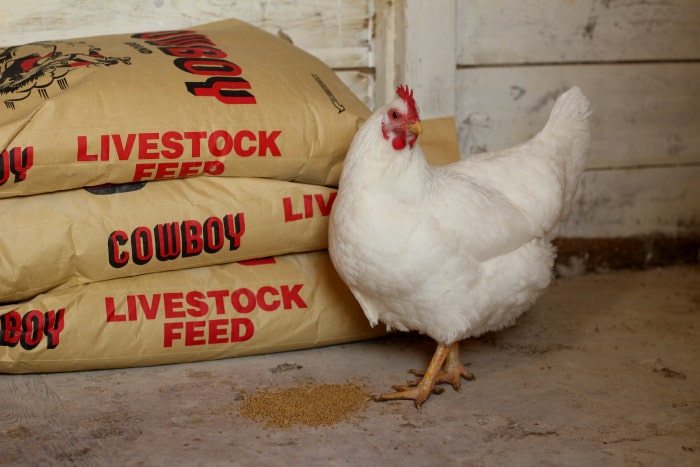
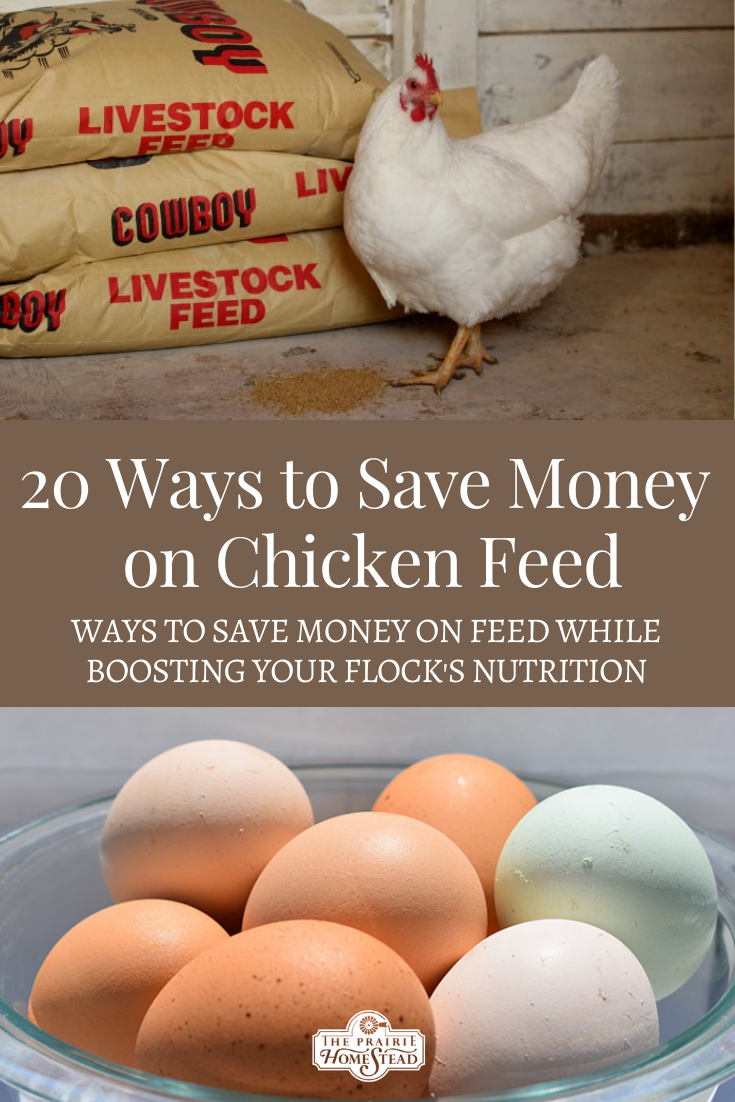
0 Response to "Feed Store Where to Buy Live Chicken"
Post a Comment